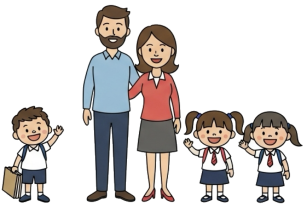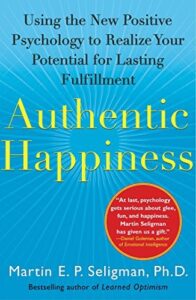
Question More, Action Knowledge.
Remember, at QMAK, we don’t just teach; we empower. We don’t just inform; we inspire. We don’t just question; we act. Become a Gold Member, and let’s unlock your child’s full potential, one question at a time.
 In our previous article, we explored the importance of nurturing authentic happiness in your homeschooler, drawing upon the insights of Martin Seligman‘s book, Authentic Happiness.
In our previous article, we explored the importance of nurturing authentic happiness in your homeschooler, drawing upon the insights of Martin Seligman‘s book, Authentic Happiness.
Building upon this foundation, we now delve into practical strategies for cultivating the mindset and habits that contribute to lasting happiness and well-being in your child’s life, integrating Seligman’s research with the QMAK philosophy of learning.
One of the central tenets of Seligman’s philosophy is the concept of the “good life,” which he defines as “using your signature strengths every day to produce authentic happiness and abundant gratification.” By helping your child identify their unique strengths and providing opportunities for them to apply these strengths in meaningful ways, you empower them to lead a life of purpose and engagement.
At QMAK, we believe in the power of self-discovery and the practical application of knowledge. Encourage your child to take the VIA Signature Strengths questionnaire, available on Seligman’s Authentic Happiness website, to gain insight into their top strengths. Once identified, work together to brainstorm ways they can incorporate these strengths into their daily life and learning. For example, if one of their top strengths is curiosity, encourage them to explore new topics, ask probing questions, and seek out opportunities for discovery and growth.
Another crucial aspect of cultivating authentic happiness is developing a strong sense of meaning and purpose. Seligman emphasizes that “the meaningful life adds one more component: using these same strengths to forward knowledge, power, or goodness.” Help your child understand that true fulfillment comes not just from personal happiness, but from using their unique talents to make a positive difference in the world.
Incorporate this principle into your homeschooling journey by encouraging your child to engage in service projects, volunteer work, or other activities that allow them to contribute to the greater good. Help them identify causes they are passionate about and explore ways they can use their strengths to make a meaningful impact in their community and beyond. By fostering a sense of purpose and connecting their learning to real-world applications, you inspire your child to become an active, engaged learner and a force for positive change.
Seligman also stresses the importance of cultivating positive emotions, such as gratitude, optimism, and hope. As he explains, “Positive emotions are the fuel for change, and they make possible resilience and well-being.” Help your child develop the habit of focusing on the good in their life and expressing gratitude for the blessings they experience each day.
Encourage your child to keep a gratitude journal, engage in daily affirmations, or practice mindfulness to promote a positive outlook and emotional well-being. Celebrate their successes and help them reframe challenges as opportunities for growth and learning. By nurturing a positive emotional landscape, you equip your child with the resilience and adaptability necessary to navigate life’s ups and downs with grace and optimism.
Finally, Seligman emphasizes the importance of building strong, supportive relationships as a key component of authentic happiness. As he notes, “Very happy people differ markedly from average people and unhappy people in one principle way: a rich and fulfilling social life.”
Prioritize social and emotional learning in your homeschooling journey, helping your child develop strong communication skills, empathy, and the ability to form deep, meaningful connections with others. Encourage them to seek out positive relationships with family, friends, and mentors who support their growth and well-being. By fostering a strong support system and nurturing their interpersonal skills, you set your child up for success in all areas of life.
By cultivating the mindset and habits of authentic happiness in your homeschooler, you empower them to lead a life of fulfillment, purpose, and well-being. As Seligman reminds us, “Authentic happiness derives from raising the bar for yourself, not rating yourself against others.”
At QMAK, we believe that by nurturing your child’s unique strengths, fostering a sense of meaning and purpose, and promoting positive emotions and relationships, you set the stage for a lifetime of authentic happiness and success. Embrace the principles of Authentic Happiness in your homeschooling journey, and watch as your child blossoms into a thriving, fulfilled individual, ready to make their unique mark on the world. By integrating Seligman’s insights with the QMAK approach of questioning more and actioning knowledge, you provide your child with a powerful foundation for lifelong learning, personal growth, and genuine happiness.

Remember, at QMAK, we don’t just teach; we empower. We don’t just inform; we inspire. We don’t just question; we act. Become a Gold Member, and let’s unlock your child’s full potential, one question at a time.